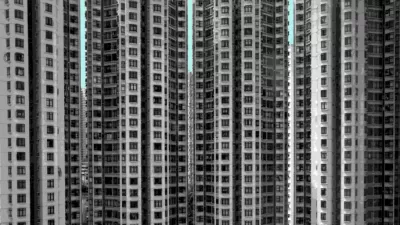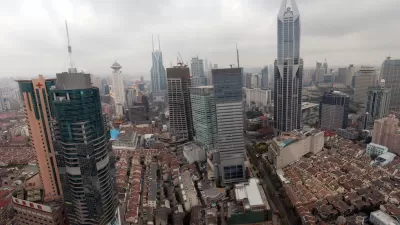A 2,000 year old household registration system in China ties temporary urban workers to rural life.
Chinese migrant workers have little incentive to become permanent residents of the cities they inhabit and work in temporarily while saving up to retire with their families in rural China. Of the 160 million who leave family farms to find work in cities, only 33 million bring their families along.
According to the Director of the Center for Chinese Studies at the University of Michigan Mary Gallagher, rural Chinese value their land and are not willing to give it up for city life where unemployment and a high cost of living are real risks. Because the Chinese government owns all land in China and farmers cannot lease or mortgage it, city workers leave behind relatives who can work the farmland, which provides enough food to feed its tenants.
An added challenge to permanent urbanization in China is the current organization of the household registration system, "hukou."
Tying rural workers to their land, the 2,000 year old hukou system categorizes all Chinese citizens as either rural or urban and links all their social benefits such as health care, education and pension to their place of birth.
Temporary urban workers are not eligible for subsidized public housing, public education beyond elementary school, medical insurance or welfare payments.
While the new administration of Xi Jinping believes in continued urbanization for economic growth, according to Chen Xiwen, head of the Communist Party office on rural policy, China's real urbanization rate is only about 35% rather than the official 53%.
Some cities are more accommodating than others, however. Since the 1990s, Shanghai, Shenzhen and Guangzhou have been allowing people to apply for local hukous if they buy property or invest a large sum in the city. Shanghai also allows those who have lived in the city as temporary tax-payers for seven years to qualify.
FULL STORY: China’s rural-urban balancing act

Planetizen Federal Action Tracker
A weekly monitor of how Trump’s orders and actions are impacting planners and planning in America.

Maui's Vacation Rental Debate Turns Ugly
Verbal attacks, misinformation campaigns and fistfights plague a high-stakes debate to convert thousands of vacation rentals into long-term housing.

San Francisco Suspends Traffic Calming Amidst Record Deaths
Citing “a challenging fiscal landscape,” the city will cease the program on the heels of 42 traffic deaths, including 24 pedestrians.

Defunct Pittsburgh Power Plant to Become Residential Tower
A decommissioned steam heat plant will be redeveloped into almost 100 affordable housing units.

Trump Prompts Restructuring of Transportation Research Board in “Unprecedented Overreach”
The TRB has eliminated more than half of its committees including those focused on climate, equity, and cities.

Amtrak Rolls Out New Orleans to Alabama “Mardi Gras” Train
The new service will operate morning and evening departures between Mobile and New Orleans.
Urban Design for Planners 1: Software Tools
This six-course series explores essential urban design concepts using open source software and equips planners with the tools they need to participate fully in the urban design process.
Planning for Universal Design
Learn the tools for implementing Universal Design in planning regulations.
Heyer Gruel & Associates PA
JM Goldson LLC
Custer County Colorado
City of Camden Redevelopment Agency
City of Astoria
Transportation Research & Education Center (TREC) at Portland State University
Jefferson Parish Government
Camden Redevelopment Agency
City of Claremont




























